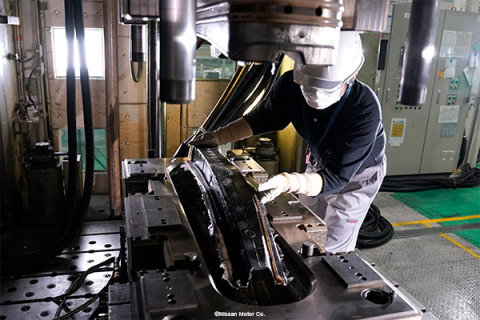ESI Contributes to Nissan’s Breakthrough in Carbon Fiber Parts Production for Safer and Lighter Vehicles
ESI Group, global player in Virtual Prototyping software and services for industry, supports Nissan Motor Co in its production process that speeds up the development of car parts made from carbon fiber reinforced plastics (CFRP). Light yet extremely strong, this material will be used to make safer and more fuel-efficient cars.
Safety, comfort and autonomy are key outcomes for consumers. To face this situation, automakers continuously innovate in different fields such as lightweight to help them achieve their expected results. For this purpose, the use of new materials can be key. Commonly used in other industries such as Aerospace and with promising capabilities, Carbon Fiber Reinforced Plastics (CFRP) were too time-consuming and too expensive to industrialize for the Automotive sector.
“We have always considered CFRP as a material for future generations of cars. But when it comes to reality, CFRP can be used only for limited models and appears to be more challenging for mass market production. Indeed, costs are high, and complex designs are required to shape CFRP. The challenge was to industrialize its production process in order to reduce costs and development time.”
Hideyuki SakamotoEVP of Nissan Motor Co.
ESI Group has been supporting Nissan’s CFRP challenge since 2015 in the evolution of its industrial product design and manufacturing methodologies for various vehicle models. The partnership was strengthened in 2018 with the CFRP mass production project.
To overcome the difficulty in shaping CFRP parts, Nissan’s engineers, helped by ESI’s solution, found a new approach: the process of Compression Resin Transfer Molding (C-RTM). The existing method involves forming carbon fiber into the right shape and setting it in a die with a slight gap between the upper die and the carbon fibers. Resin is then injected into the fiber and left to harden. Nissan’s engineers developed techniques to accurately simulate the permeability of the resin in carbon fiber, while visualizing resin flow behavior in a die using an in-die temperature sensor and a transparent die. The result of the successful simulation was a high-quality component with shorter development time. Using Virtual Prototype of the product, Nissan succeeded: a high-quality component with a development time reduced by 50% and reduced by 80% of single molding.
“We are proud of the support we have brought Nissan over the years and throughout this project. We have helped them succeed in the full development process, from the design to the manufacturing of mass-produced CFRP parts, thus enabling their breakthrough for lighter and safer vehicles. Nissan’s success embodies our mission to enable industrial players to commit to outcomes. With our Smart Manufacturing solution and our historical expertise in materials, we helped them reach their ambitions,”
Cristel de RouvrayCEO of ESI Group
